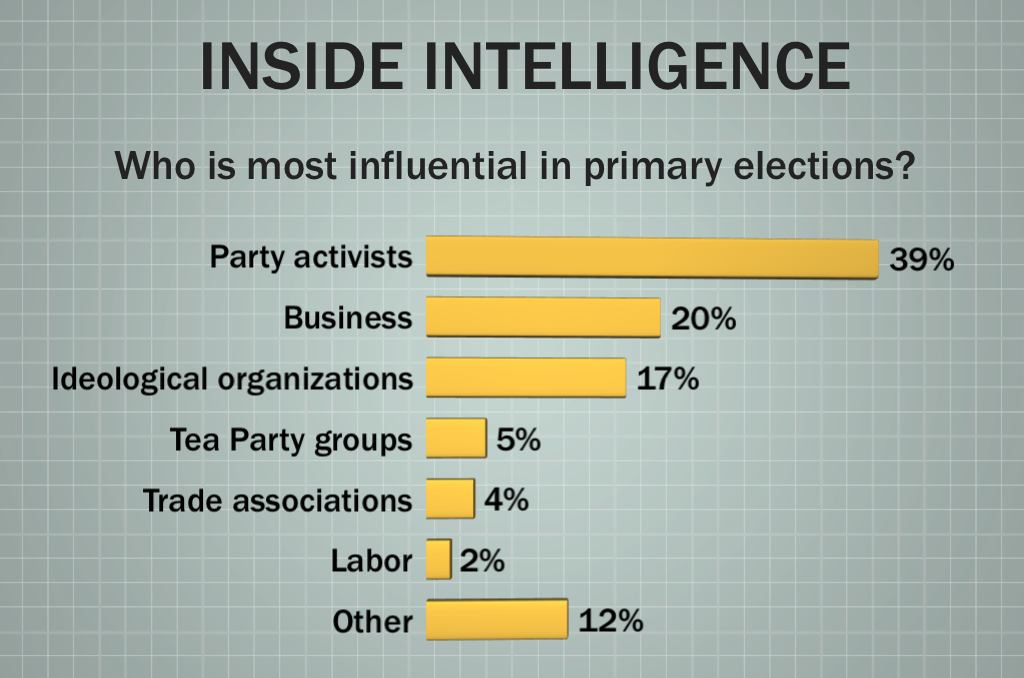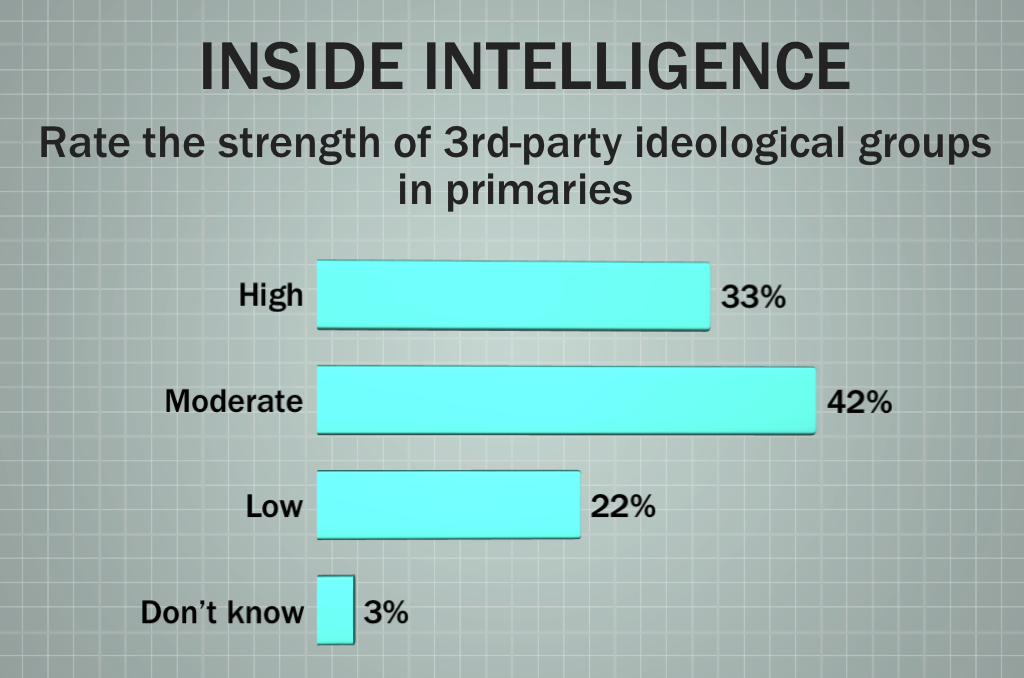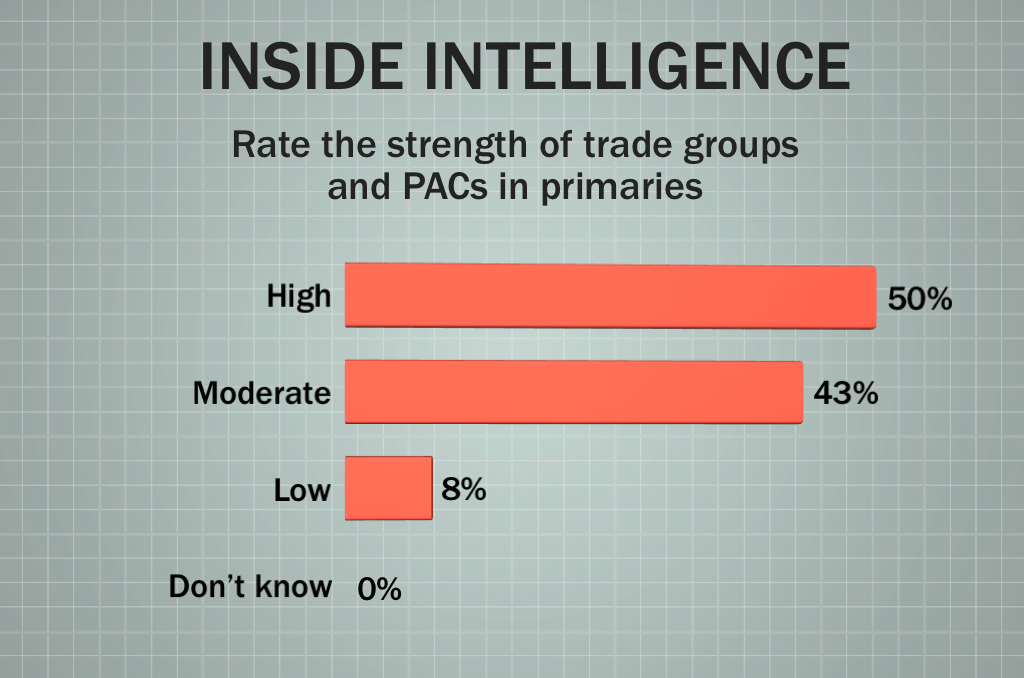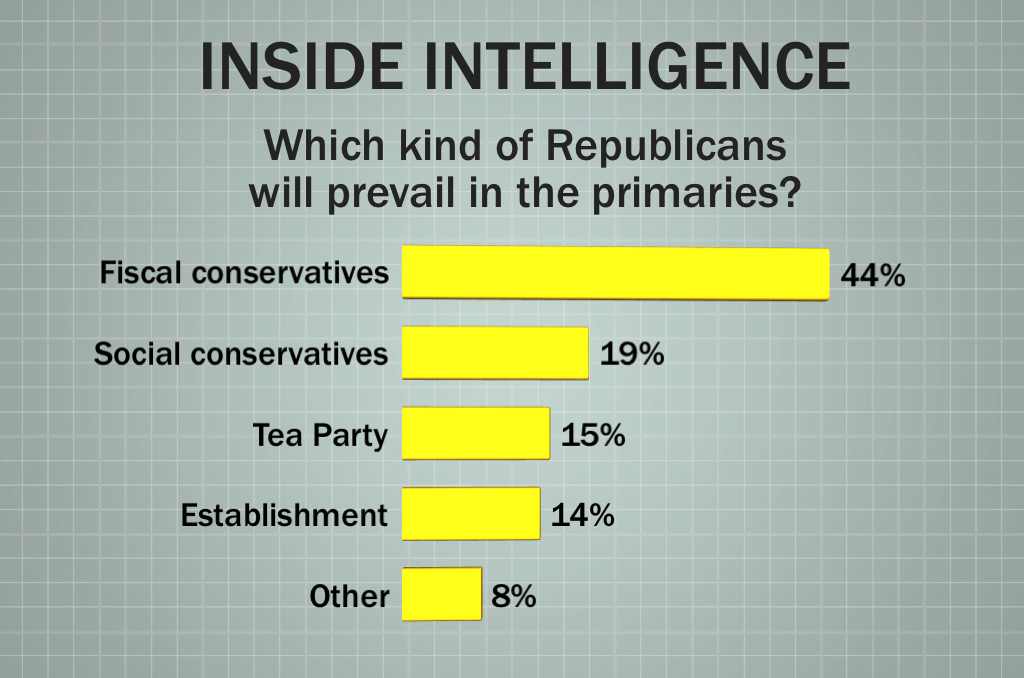Inside Intelligence: Third Parties Calling
/https://static.texastribune.org/media/images/inside_intelligence-logo.png)
With Texas politics in a state of suspended animation, we asked the insiders about the groups that will be behind some of the candidates in this year's primaries, whether those are strong forces or weak ones, and what sorts of candidates will prevail.
Party activists are the most influential group in primary elections, according to the insiders who responded. Business groups were next, followed by ideological organizations.
Third-party ideological groups of whatever stripe have only moderate influence in the primaries, according to 42 percent of the insiders. But one in three believes the groups' influence is high; one in five believes it's low.
Half of the insiders believe trade groups and PACs have a high level of strength in the primaries, perhaps an indication of the occupations of many of the insiders. Another 43 percent say those groups have moderate influence and only 8 percent think the groups' influence is low.
Finally, we poked at the fissures in the state's dominant party, asking the insiders which sorts of Republicans will prevail in the primaries this year. Fiscal conservatives came in first, with 44 percent of the insiders, followed by social conservatives at 19 percent, Tea partiers at 15 percent and establishment Republicans with 14 percent.
As always, we've attached the full set of verbatim comments to our questions; a sampling follows.
What group or interest is most influential in Texas primary elections?
• "Money, from whatever source."
• "Lobby cartels who direct 2/3 of all campaign contributions."
• "Popular and partisan locally elected officials."
• "Individual wealthy persons."
• "It is not possible to segment out groups and organizations as single focused. The overlap between Ideological groups and pragmatic groups is significant. Most social conservatives are also fiscal conservatives. Most are very pro-business. And they advocate for all. Message development is complex because these issues overlap with other groups. If groups were segmented cleanly, campaigns would be very easy."
• "Teacher unions. Automatic withdrawal from teacher paychecks needs to stop."
• "Republicans: a tie: Texas Association of Business and Texans for Lawsuit Reform... Democrats: tie: Texas Trial Lawyers Association and teachers' union(s)"
How would you rate the strength of third-party ideological groups in legislative elections in Texas?
• "Because they can dominate Republican primaries, which is where the action is."
• "The strength and influence of third-party ideological groups was strong enough to convince moderate Republican legislators to take more extreme positions to ward off possible challengers. What did they get for compromising their principles? Ideological conservative primary challengers."
• "Some incumbents overestimate their reach, ironically granting them exaggerated influence"
• "In a tight race they make the difference."
• "GOP right-wingers and tea party seem to rule the recent GOP primaries, which currently is all that matters in this messed up state."
• "In some districts these groups have the ability to "disqualify" or defeat a candidate by rejecting them - - or just smearing them."
• "Not as significant as they think, but meaningful."
How would you rate the strength of traditional third-party groups like trade associations and political action committees in legislative elections in Texas?
• "In the absence of other readily available information, people turn to their associations. They are not as influential a force as they were 20 years ago."
• "Except for the NRA, trade associations don't mean anything. PAC's are good for money and if they are generous, can be strong, but not because of their name."
• "It's all about the money!"
• "TAB, TLR, and others traditionally strongly support Republicans, whereas the Dems are primarily funded by the trial lawyers. Many candidates would not be in office were it not for receiving funds and support from groups like these... Also, don't discount the effect of wealthy individuals whose checks can match or exceed those of many trade groups and PACs."
• "It can be "high" in certain races, and those are often the more publicized situations, but overall it is moderate."
• "Too high. The unlimited cash drives the focus immediately away from voter education and directly to voter persuasion."
Which kinds of Republicans will prevail in primary races this year?
• "Social conservatives may be the only ones who are paying enough attention to know when the primary in Texas will be this year."
• "GOP candidates kowtow to the nutty social conservatives. Until rational voters wake up and realize that governing is the point, this state will remain at the bottom of everything."
• "It's going to depend on the election date and turnout. The lighter the turnout, the more the tea party/fiscal and social conservatives benefit. The heavier the turnout, the more "establishment" Rs benefit."
• "It depends on when the primaries take place, and whether or not they are bifurcated. There won't be much of a primary on the Democratic side, so speaking of Republicans. If there is a unified primary and the presidential nominating contest is still in play, that will favor more mainstream candidates down ballot. Other scenarios will benefit more hard line candidates."
• "Taking KBH as the prototype "establishment" Republican, the winners this year will be an amalgamation of Fiscal/Tea/Social, with little or no establishment in the mix."
• "Surviving Republican candidates will be skillful at balancing Tea Party Activists and more moderate groups."
Our thanks to this week's participants: Cathie Adams, Clyde Alexander, Doc Arnold, Charles Bailey, Mike Barnett, Dave Beckwith, Andrew Biar, Allen Blakemore, Tom Blanton, Hugh Brady, Chris Britton, Andy Brown, Lydia Camarillo, Kerry Cammack, Thure Cannon, Snapper Carr, Tris Castaneda, Corbin Casteel, William Chapman, Elizabeth Christian, Elna Christopher, George Cofer, Rick Cofer, Harold Cook, Randy Cubriel, Hector De Leon, June Deadrick, Tom Duffy, David Dunn, Richard Dyer, Jeff Eller, Jack Erskine, Alan Erwin, Gay Erwin, Jon Fisher, Norman Garza, Bruce Gibson, Eric Glenn, Kinnan Golemon, Daniel Gonzalez, John Greytok, Michael Grimes, Clint Hackney, Wayne Hamilton, Sandy Haverlah, Albert Hawkins, Jim Henson, Ken Hodges, Shanna Igo, Deborah Ingersoll, Robert Jara, Cal Jillson, Jason Johnson, Mark Jones, Richard Khouri, Tom Kleinworth, Ramey Ko, Tim Lambert, Pete Laney, Dick Lavine, James LeBas, Donald Lee, Luke Legate, Leslie Lemon, Richard Levy, Vilma Luna, Matt Mackowiak, J. McCartt, Dan McClung, Parker McCollough, Mike McKinney, Robert Miller, Bee Moorhead, Craig Murphy, Keir Murray, Pat Nugent, Nef Partida, Gardner Pate, Jerry Philips, Wayne Pierce, Royce Poinsett, Kraege Polan, Jerry Polinard, Jay Propes, Andrea Rado, Bill Ratliff, Karen Reagan, Tim Reeves, Kim Ross, Jason Sabo, Mark Sanders, Andy Sansom, Jim Sartwelle, Stan Schlueter, Bruce Scott, Steve Scurlock, Dee Simpson, Ed Small, Martha Smiley, Larry Soward, Dennis Speight, Jason Stanford, Bob Strauser, Colin Strother, Michael Quinn Sullivan, Sherry Sylvester, Russ Tidwell, Trent Townsend, Trey Trainor, Ware Wendell, Ken Whalen, Darren Whitehurst, Michael Wilt, Seth Winick, Peck Young, Angelo Zottarelli.
Texas Tribune donors or members may be quoted or mentioned in our stories, or may be the subject of them. For a complete list of contributors, click here.
Information about the authors
Learn about The Texas Tribune’s policies, including our partnership with The Trust Project to increase transparency in news.




/https://static.texastribune.org/media/profiles/ramsey-ross_TT.jpg)